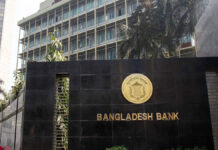Bangladesh was ranked 10th in a global slavery index released on Thursday with nearly 0.35 million people living in conditions of modern slavery.
Australian-based rights organisation ‘Walk Free Foundation’ compiled the index defining modern slavery as debt bondage, forced marriage and victims of human trafficking.
For Bangladesh, the report primarily attributed sexual exploitation, forced labour and bonded labour, both within its borders and overseas, to the high number of slaves.
It said Bangladeshi people were enslaved overseas in the Middle East, in neighbouring Southeast Asian countries, and Europe, among others.
It also reportedly found debt bondage in Bangladesh’s shrimp and tea industries, as well as in brick-making and forced begging.
The report ranked 162 countries and said nearly 30 million people around the world are living as slaves.
The number is higher than other attempts to quantify modern slavery. The International Labour Organisation estimates nearly 21 million people are victims of forced labour.
India topped the list with nearly 14 million people living with such conditions, followed by China and Pakistan, which are home to nearly 3 million and 2.1 million slaves respectively.
Nigeria, Ethiopia, Russia, Thailand, the Democratic Republic of Congo, and Myanmar are the other countries that complete the top 10 list that accounted for more than three-quarters of the total estimated slaves.
The report has the backing of world figures including former US Secretary of State Hillary Clinton, and ex-British Prime Minister Tony Blair called the findings “hidden crime”. The authors hoped that the report would help governments address the problem.
The authors also claimed the report contained the most authoritative data on slavery conditions worldwide.
“Today some people are still being born into hereditary slavery, a staggering but harsh reality, particularly in parts of West Africa and South Asia,” the report said.
“Other victims are captured or kidnapped before being sold or kept for exploitation, whether through ‘marriage’, unpaid labour on fishing boats, or as domestic workers.
Others are tricked and lured into situations they cannot escape with false promises of a good job or an education”.
The report estimated that, in the past 30 years, more than one million Bangladeshis have been enslaved in the Middle East, in neighbouring Southeast Asian countries, and Europe.

It said despite massive rural to urban migration in the last 25 years, more than 80 percent Bangladeshi population resides in rural areas where, it says, poverty prevails, just as unemployment does in urban areas.
According to the report, “these push factors account for such a large migrant worker population”. Some of these migrant workers — men, women and children — are in bonded labour, debt bondage, and forced labour in a variety of industries throughout Bangladesh.
Apart from reported debt bondage in shrimp and tea industries, the report also identified groups that are most vulnerable to enslavement.
They include women, children, the poor, the illiterate, ethnic Rohingya refugees and internally displaced persons due to climate change or natural disasters.
The report also noted Bangladesh government’s steps to address modern slavery and made some recommendations.
The Bangladesh Labour Act of 2006, Women Development Policy of 2011, the Child Labour Elimination Policy of 2012 and the Children Policy of 2011 have been seen as steps to address modern slavery.
It also noted that Bangladesh had ratified the key international treaties relevant to modern slavery, except for the Palermo Protocols.
The report suggested that Bangladesh complete the process of ratifying the Palermo Protocols and approve the implementing rules for the 2012 Human Trafficking Deterrence and Suppression Act (HTDSA).

It also suggested comprehensive assistance for all victims of modern slavery and establishing bilateral agreements with the governments of destination countries to protect Bangladeshi migrant workers.
It has also noted the steps the Ministry of Home Affairs has taken in partnership with UN bodies that include a task force for rescue, recovery, repatriation and reintegration of trafficking survivors, particularly women and children.
It suggested the government to regulate the role of BAIRA.
Walk Free CEO Nick Grono said the annual index would serve as an important baseline for governments and activists in the anti-slavery fight.
“This kind of data hasn’t been out there before,” he said.
“It’s a multi-year effort, and next year we’ll have a much better picture of where slavery is and what changes there are. If you can’t measure it, you can’t devise policy to address it”.
Source: bdnews24










